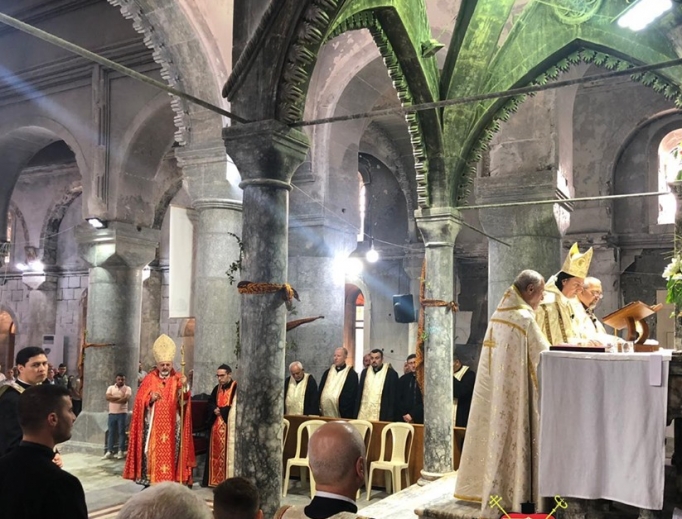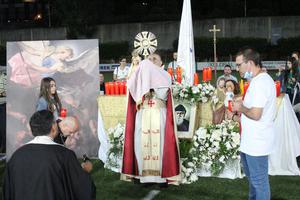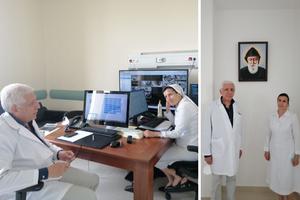Iraqi Archbishop: ‘The Faith Is Alive’ Despite ISIS’ Devastation
Syriac Catholic Coadjutor Archbishop Nathanael Nizar Semaan told the Register, ‘Qaraqosh and all these Christian villages are giving a big witness of their faith, how strong it is. We are here.’

Five years ago this summer, Christians in the Nineveh Plain of Iraq were driven out from their ancient homelands by ISIS, literally overnight. In just a few hours, the Islamic State terrorist group emptied the plain of more than 100,000 Christians, including all of the 50,000 Syriac Catholic residents of Qaraqosh.
From their place of exile in the Kurdistan region of Iraq, around 20,000 Christians have returned to Qaraqosh in the last year and a half. They have a new shepherd, Syriac Catholic Coadjutor Archbishop Nathanael Nizar Semaan, who also returned to his birthplace of Qaraqosh for his new mission, which began June 7, after serving 14 years as a priest in London. He will work in tandem with Archbishop Yohanna Boutros Moshe, Syriac Catholic archbishop of Mosul, Kirkuk and Kurdistan. In an interview with the Register in Lebanon, Archbishop Semaan spoke about the challenges of his new mission and the deep faith of Syriac Catholics in Qaraqosh.
What was it like growing up in Qaraqosh, related to the faith?
It is a great city, really. I grew in faith in Qaraqosh. All the church activities had a big impact on my life. From there, I started my vocation, and, now, I’m coming back to serve my city. Qaraqosh is in my heart, in my thoughts, in my prayers. It’s a font of the faith. It’s a font of vocations: priests, nuns, monks. It’s a very rich city, regarding vocations and regarding the faith. This is Qaraqosh in a short word.
How did it feel to return to the Church of the Immaculate Conception in Qaraqosh for your episcopal ordination June 7 as coadjutor archbishop, the church where you were ordained a priest, to see it damaged and blackened from the ravages of ISIS?
It was hard to see the church as it is now, all burned by ISIS. But I insisted to have my ordination there, to witness the suffering that my city faced, with all the people, the reality of what happened during all four years when ISIS occupied our cities.
I feel sad to see my church bombed, but I also feel happy because, through this ordination, it might give a sign of hope — that no matter what, the faith will remain as strong as it is. That’s very important. What a criminal act to bomb all these churches and monasteries!

How many people have settled back in Qaraqosh, and what is your assessment of the situation there?
All our buildings were destroyed.
Rebuilding started one and a half years ago, beginning with the houses. Our interest was to take care of the people first, before rebuilding our churches and restoring their beauty.
We don’t have exact numbers, but around 20,000 have returned. The situation is still bad, especially economically. There are no jobs. Nevertheless, the people are starting to look towards the future with a positive eye, although they don’t know what the future will be. Fortunately, their faith gave them strength.
The important thing is to create opportunities for jobs, especially for young people. These young people, if in two or three years they don’t find a job and they don’t find something to sustain their families, I don’t think they will stay there forever.
The big challenge is how to work with the international community to make them understand this reality. We [the Church] can’t ask our people to stay while we can’t offer them anything. You have to offer them something, and then you ask them to stay. Unfortunately, the Iraqi government is not offering anything.
So what we ask of international organizations is to try to create opportunities for jobs for our people. If opportunities for jobs are created, this would be a sign of hope for these people to stay and continue, I hope, for a long time.
What about the aid promised from the United States government? Is it being realized?
To say the truth, I have no idea, because immediately after my ordination we started our [Syriac Catholic] synod [in Lebanon]. Now I will have the opportunity to learn about all these things, to listen, to see what’s going on.
But I hope that all — and not just from the United States, but every organization — will work with the local churches and not with the [Iraqi] government organizations, because in dealing with [Iraqi] government organizations, the money doesn’t really reach the right point. It is better to deal with the local churches, to be sure the funds are going towards a project that will be realized on the ground.
What are some of your top priorities in your new mission?
We have to rebuild the human being, before anything. We have to work hard on rebuilding the trust and trying to cure the wounds of these human beings. Inside every one of our people, there is a deep wound because they had to flee their city in 2014. It’s a big job to try to work with them to cure their wounds and to open for them a new page.
And on this new page they are going to write their new story — a story full of hope. This will be a very important point of our mission. This takes time.
I’m not going to be sitting in the office waiting for people to come to me. I’m going toward people to see how I can help and will work with other priests in the diocese to cure the wounds of these people. We are going to work hard to open for them a new page, a new future, a future of hope.
How is the situation in Mosul, the historical seat of your diocese?
Yes, the seat was in Mosul, but now I am based in Qaraqosh because we don’t have people who have returned to Mosul. We have only a few families.
I want to be realistic. In the near future we might not have people going back to Mosul because everything is destroyed there. I hope it will take a short time, but in my view, in one to two years, this is not possible.
What is needed for Christians in Iraq, and what are the challenges they face?
First, to be supported economically and to be supported politically, to make sure they’re going to have a future there. No one knows what the future will be, but at least we work for it.
In this way, the Christians will stay there; otherwise, they’re going to leave, and I hope not.
We just want to be respected as a human being, to have our rights, whether we are in Kurdistan, Mosul or Kirkuk — wherever we are. We want to be considered as citizens, first-class. Not second- or third-class, absolutely.
We have to have the freedom to practice our faith. We’re not asking anything extraordinary; we just ask for human rights, very basic human rights.
I will try my best not to be a political man, but to be a man of faith, a man of prayer, a man of taking care of the people. Surely when someone is trying to hurt my people, I will raise my voice.
We are not foreigners in Iraq. We are in our own country, so what we want is to live in our country, to be respected and to have all our rights, and our duties, too.
I repeat: I’m not a political man. I’m a bishop. A man of faith, I’m a pastor. I like to guide our people in a right path, in a peaceful path and to rebuild our cities and our people according to the will of God, not to the will of politicians or anything else.
What are the threats that still exist for Christians in Iraq?
Right now the security is not 100%, although it is a bit stable and better than before. Also, there are demographical changes, and we are seriously worried that part of Christian lands will be taken and given to other people; and this is not a right thing to do.
We have to work hard for this issue, really. We don’t want to be closed, but we don’t want to give our lands to other people who don’t belong to that place.
Can you be more specific? Do you mean Muslims?
I don’t specify Muslims. I specify people who don’t belong to lands according to the 1957 census, the principal census. The people that belong to that area have the right to the land, and the people who don’t belong don’t have the right. Iraq is very big. So why force or surround the Christian people and take their lands? I hope this will not happen. But it’s a challenge now. It’s going on in all of Iraq, not just Christian cities. The demographical change is a big danger now. There is some plan going on; it’s not a formal plan, but it’s going on.
It’s good to mention it, to pay attention, that demographical change in the Nineveh Plain is not good for the Christians.
What can the international community do?
At least they can advise the Iraqi government — more than advise — to stop this kind of demographic change; because if the Christians feel that their lands are going to be taken, they will leave.
How will you work with other churches in carrying out your mission?
Closely, very closely. I will work very closely with the Chaldean Church, with the Syrian Orthodox Church; they are present in our diocese, and I will try my best to have an open mind towards them, to have projects together, because we are in the same boat, in the same situation. My priority is to work closely together with other bishops for the good of the Christians in Iraq, no matter whether they are Syriac, Chaldean, Orthodox. If we work hand in hand, if we have a clear plan and work for it, I think our Christian brothers and sisters will have a good result. If we are divided, we are going to lose everything.
What are your hopes for the visit of Pope Francis to Iraq in 2020?
The visit of the Holy Father for sure will have a big impact on our existence in Iraq. I hope it will be organized in a right way to make sure that every Christian — everywhere in Iraq — feels that the Holy Father is coming for him, to visit him, to talk to him and to give him a sign of hope for the future.
We care about a visit which gives hope to the people, and I think that’s what the Holy Father is intending to do. I think his visit is a sign of hope, and that’s what we want it to be, and so I think we have to prepare for it in a good way, with all the churches in Iraq — Chaldean, Syriac Catholic, Syriac Orthodox, Armenian, whatever else — cooperating all together, to start preparing a program for the Holy Father.
We want the Holy Father to come to the north of Iraq, where the majority of Christians are, like Qaraqosh, Alqosh, Ankawa. It will be good for the Holy Father to visit these villages because they are the sign of the future of Christianity in Iraq, and I wish that the Holy Father and people who organize his visit do not forget this point of view.
What are the signs of hope in Qaraqosh?
If you go to Qaraqosh now and see the kinds of activities they are doing, you would say, “What amazing people they are.”
The activities for youth, for children — churches open; churches full of people. You would say, “Is it true? These people are really doing what they are doing after what they faced in four years?”
They have come back to their normal activities, to their active Church. This activity comes from their strong faith.
I invite everyone to visit Qaraqosh and to see the kinds of activities going on there. I think you would be surprised.
For example, we have the St. Paul Center, which we rebuilt. In ISIS’ time [of occupation] I think it was [transformed into] a mosque. Every day this center is full of pastoral activities: catechism, meetings, music.
We had first Communion for around 400 children in April. I wasn’t there yet. Now we have summer catechism; around 800 people every day attending for two, three hours; and a women’s meeting once a week, 1,000 women attending.
The choirs, Masses, evening prayers, morning prayers — it’s amazing. You will be surprised to see the city now, really. What a wonderful city. What wonderful people. I’m excited to work with them.
Despite all the difficulties, we have these kinds of activities now. Imagine, if we have tranquility, if we have peace, if we have peace of mind, how active the city will be. It’s worth it to work for it, really.
The faith is alive. It’s alive. It’s alive. Qaraqosh and all these Christian villages are giving a big witness of their faith, how strong it is. We are here.
Doreen Abi Raad writes from Beirut, Lebanon.














